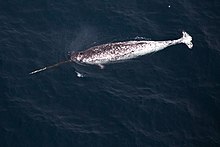narwhal
Appearance
English
[edit]
Alternative forms
[edit]Etymology
[edit]From Dutch narwal or Danish/Norwegian Bokmål narhval, from Old Norse náhvalr, from nár (“corpse”) + hvalr (“whale”). Compare Icelandic náhvalur.
Pronunciation
[edit]- (UK) IPA(key): /ˈnɑːʍəl/, /ˈnɑːwəl/, /ˈnɑːˌʍeɪl/, /ˈnɑːˌweɪl/
Audio (Southern England): (file)
- (US) IPA(key): /ˈnɑɹʍəl/, /ˈnɑɹwəl/, /ˈnɑɹˌʍeɪl/, /ˈnɑɹˌweɪl/, /ˈnɑɹʍɔl/, /ˈnɑɹwɔl/, /ˈnɑɹʍɑl/, /ˈnɑɹwɑl/
Noun
[edit]narwhal (plural narwhals or narwhal)
- Monodon monoceros, an Arctic cetacean that grows to about 20 feet (6 meters) long, the male having a single horn-like tusk, a twisted, pointed canine tooth that projects forward.
- Synonym: sea unicorn
- 1986, D. E. Sergeant, “Chapter 16: Sea Mammals”, in I. P. Martini, editor, Canadian Inland Seas[1], page 337:
- Moreover, both narwhals and bowheads can occur in late summer in southern Prince Regent Inlet (coming from Lancaster Sound) and may reach Fury and Hecla Strait and northern Foxe Basin.
- 1988, Tristan Jones, Somewheres East of Suez[2]:
- Often, in the morning, narwhals played around the boat and reminded me of the dolphins, so far away in the North Atlantic. But these narwhals were not like the Atlantic sea-dogs; they had little of their flashing vibrancy; these Turkish narwhals were much more relaxed, and rolled over lazily, with a sigh, as if they were going to retire to a sofa and smoke a hookah.
- 2000, Richard C. Connor, Andrew J. Read, Richard Wrangham, edited by Janet Mann, Cetacean Societies: Field Studies of Dolphins and Whales[3], 10: Male Reproductive Strategies and Social Bonds, page 247:
- At over 2.5 m in length, the tusk of the male narwhal (Monodon monoceros) is one the most impressive instruments of male-male competition among mammals.
Derived terms
[edit]Translations
[edit]Arctic cetacean
|
Manx
[edit]Etymology
[edit]From English narwhal, from Old Norse náhvalr.
Noun
[edit]narwhal m (genitive singular narwhal)
- narwhal
- Synonym: whale feeacklagh
Categories:
- English terms borrowed from Dutch
- English terms derived from Dutch
- English terms borrowed from Danish
- English terms derived from Danish
- English terms borrowed from Norwegian Bokmål
- English terms derived from Norwegian Bokmål
- English terms derived from Old Norse
- English 2-syllable words
- English terms with IPA pronunciation
- English terms with audio pronunciation
- English lemmas
- English nouns
- English countable nouns
- English nouns with irregular plurals
- English indeclinable nouns
- English terms with quotations
- en:Cetaceans
- Manx terms borrowed from English
- Manx terms derived from English
- Manx terms derived from Old Norse
- Manx lemmas
- Manx nouns
- Manx masculine nouns
- gv:Cetaceans


